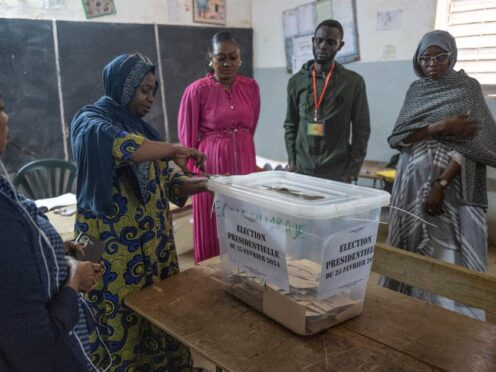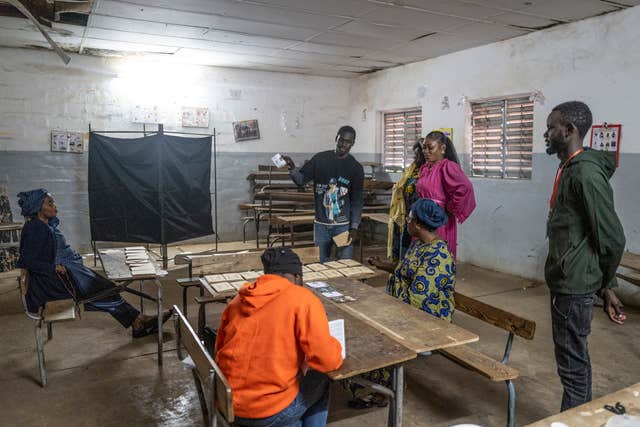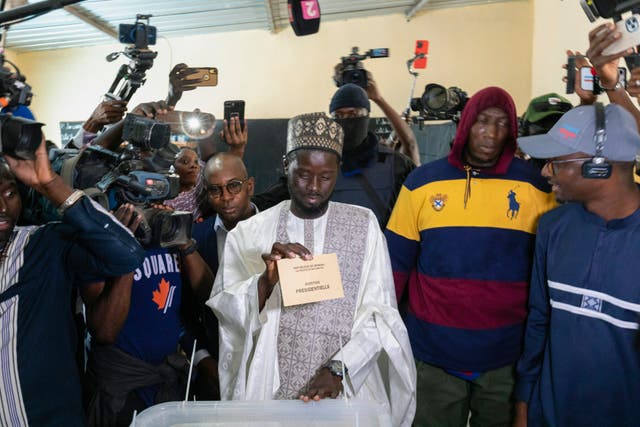
People in Senegal have voted in a tightly contested presidential race following months of uncertainty that has tested the West African nation’s reputation as a stable democracy in a region shaken by a wave of coups in recent years.
The election comes after President Macky Sall unsuccessfully tried to postpone the February 25 vote until the end of the year, sparking violent protests.
Mr Sall was barred by the constitution from seeking a third term. As a result, the vote is taking place during Ramadan, the holy month when observant Muslims fast from dawn until dusk.

Vote counting began in the early evening in a tense atmosphere in some parts of the country. In St Louis, a major fishing town, a crowd booed and threw stones at a government delegation that entered a polling station after the polls closed.
Observers said turnout among the more than seven million registered voters appeared to be high in the morning, though more precise figures would be available later on Sunday.
Babacar Gueye, who heads Senegal’s COSCE civil society network of observers, said participation was important to give the election legitimacy.
“At the opening of polling stations today, I have never in the past 15 years seen so many people going to vote,” he told The Associated Press.
Queues formed outside polling stations around the capital Dakar. Roads were quiet as the nation’s elite police force was deployed across the city in armoured vehicles, checking voters’ cards. Official results are expected next week but the leading candidates said they would know first results on Sunday night.
In the run-up to the election, opposition leader Ousmane Sonkowas was released from prison last week, triggering jubilant celebrations on the streets of Dakar and renewed excitement about the contest.
Mr Sonko was barred from running due to a prior conviction for defamation and is backing his key ally Bassirou Diomaye Faye, who was also freed from prison last week.

Khodia Ndiayes, a 52-year-old cook, said she picked Mr Faye on the ballot because she wanted Mr Sonko to win.
“I’m proud to have voted,” she said. “We need a new president because life is expensive, the economy is bad and we need better schools.”
At the forefront of concerns for many Senegalese voters is the economy, which has been squeezed by high food and energy prices partly driven by the war in Ukraine.
Almost a third of Senegal’s youth are unemployed, according to the independent researcher Afrobarometer, driving thousands to risk their lives on dangerous journeys in search of jobs in the West.
“Young people have master’s degrees but they’re selling coffee on the side of the street or are motorbike taxi drivers — there’s no work,” said Cheikh Omar Sy, who works for an international development agency in Dakar.
Senegal has stood apart in a region where the military has seized power from civilian governments in Mali, Niger and Burkina Faso. The election is set to be the nation’s fourth democratic transfer of power since it gained independence from France in 1960.
Despite Senegal’s record, the electoral process over the past year has been marred by violence and unrest, with dozens killed and hundreds of opposition protesters jailed.
There are 19 candidates in the race, including one woman, the highest number in the nation’s history, although a couple dropped out to support the team backed by Mr Sonko.
Analysts say no candidate is expected to win more than 50% of the vote, which means a run-off is likely and more coalition building could lie ahead.
Along with Mr Faye, hopefuls include Amadou Ba, a former prime minister; Khalifa Sall, a former mayor of Dakar unrelated to the president; and Idrissa Seck, a former prime minister from the early 2000s who was the runner up in the 2019 presidential race.

Enjoy the convenience of having The Sunday Post delivered as a digital ePaper straight to your smartphone, tablet or computer.
Subscribe for only £5.49 a month and enjoy all the benefits of the printed paper as a digital replica.
Subscribe